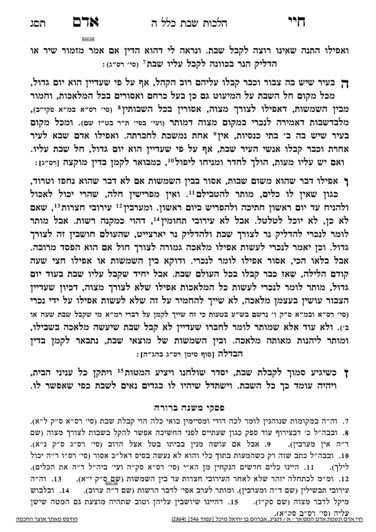We are continuing in siman 5, where the Chayei Adam explained the difference between early Shabbos accepted by an individual as opposed to a community. This difference explains the contradictions between the various places in the Shulchan Aruch which discuss what is assur during bein hashmashos.
There is another answer, not mentioned by the Chayei Adam, but relevant for the idea which will be discussed in the next siman. This answer is given by the Shulchan Aruch Harav and Dagul Meirevavah. They explain that there is a difference between tosefes Shabbos and kedushas Shabbos atzmah, the “full” kedushas Shabbos. When we discuss adding time to Shabbos, arguably, one is only accepting upon themselves the mitzvah of adding onto Shabbos. We could argue that Chazal understood that by accepting the issurei deoraysa of Shabbos, one has sufficiently added onto Shabbos. If so, issurei derabanan, or, at least some dinei derabanan, do not need to be accepted in order to fulfill the mitzvah of tosefes Shabbos. However, if one accepts the “full” kedushas Shabbos, they accept all issurim, without exception. They are bringing the kedushas Shabbos into the day before, which automatically includes all issurim. Even though one cannot change erev shabbos into shabbos, one can bring the kedusha of shabbos into the time before.
Therefore, when one davens maariv or lights Shabbos neiros, as one is calling it “Shabbos”, it could be argued they are not just accepting tosefes Shabbos, but Shabbos itself, so everything is assur. However, if one only accepts tosefes Shabbos, some dinei derabanan will be muttar.
We need to clarify a point about the communal acceptance of Shabbos. When the Chayei Adam writes that when the community accepts Shabbos, all issurim apply, these issurim are binding not just to bein hashmashos. Rather, it applies from the moment at which they accepted Shabbos, even if there is much time left until sunset.
And according to the approach just mentioned above, if the community or an individual only accepts tosfes Shabbos, there will be certain things which are muttar, even during bein hashmashos. However, if they accepted the full kedushas Shabbos, everything will be assur from whenever they decided to accept Shabbos, even if it was much before sunset.
Summary
Another approach differentiates whether one accepts tosefes Shabbos, where they are only accepting the issurei deoraysa of Shabbos, and some issurei derabanan may not be binding until after bein hashmashos and if one accepts the “full” kedushas Shabbos, where all issurim apply. The poskim assume that hadlakas neiros or davening maariv cause one to accept the “full” kedushas Shabbos.



